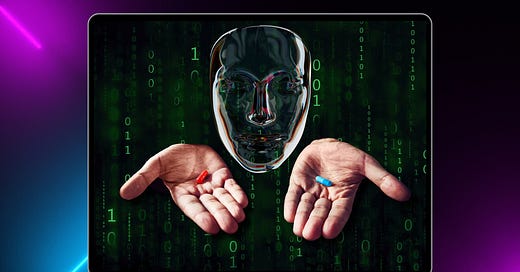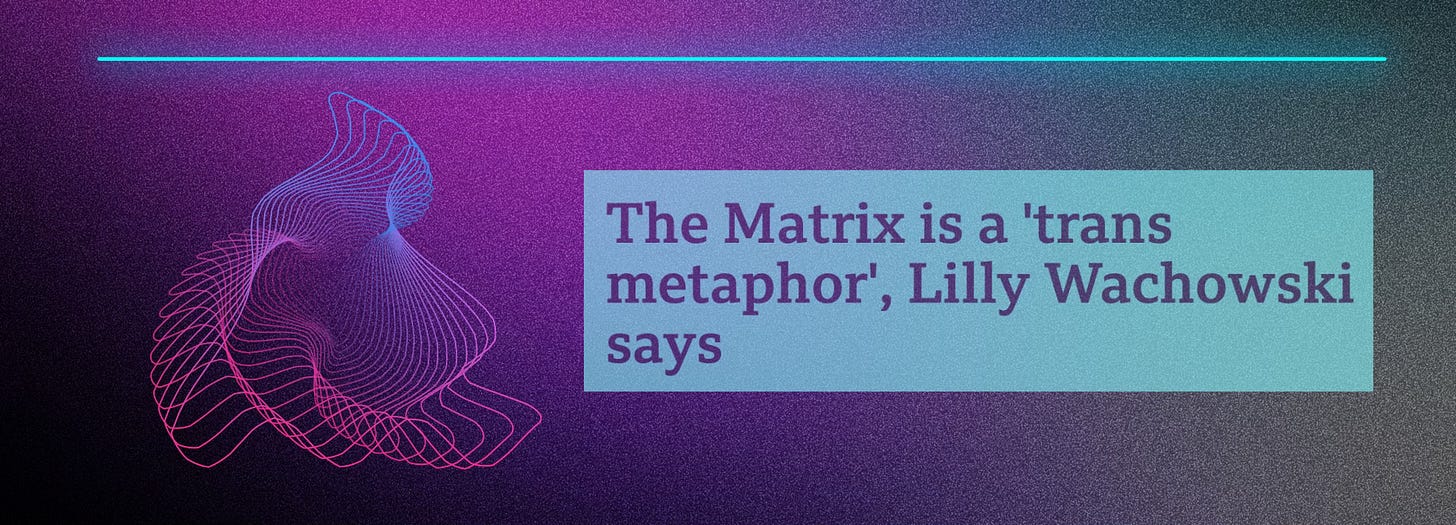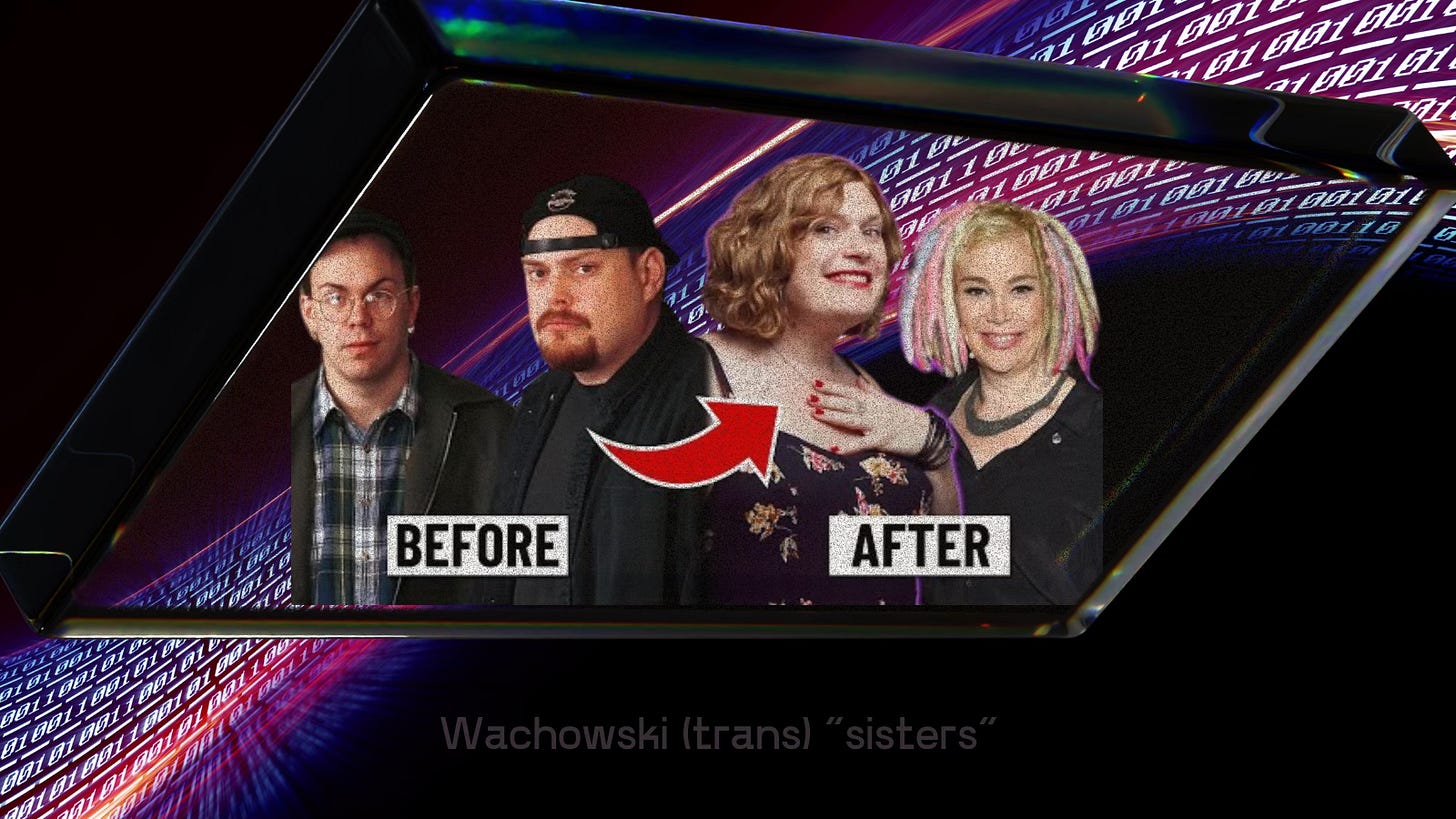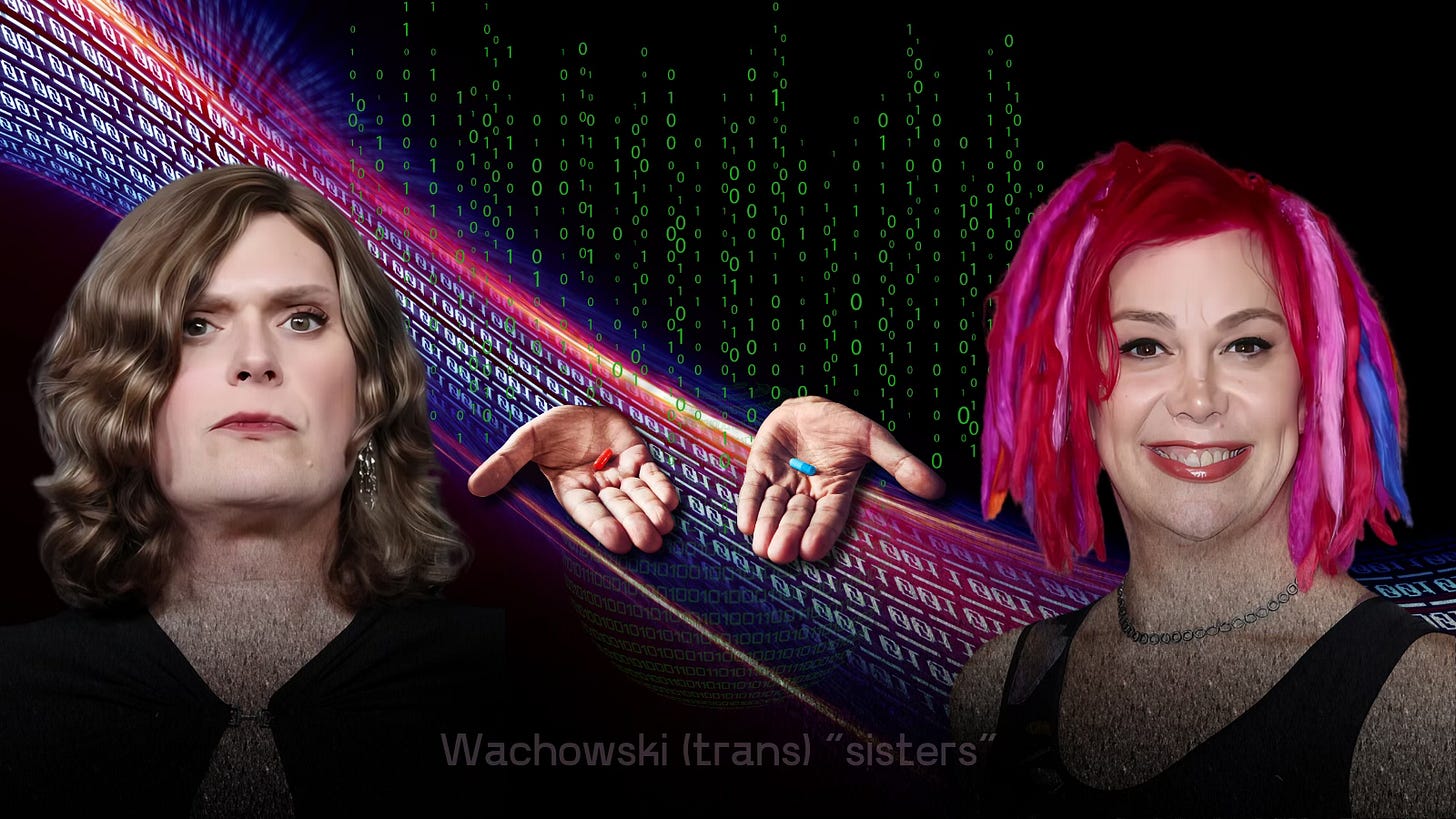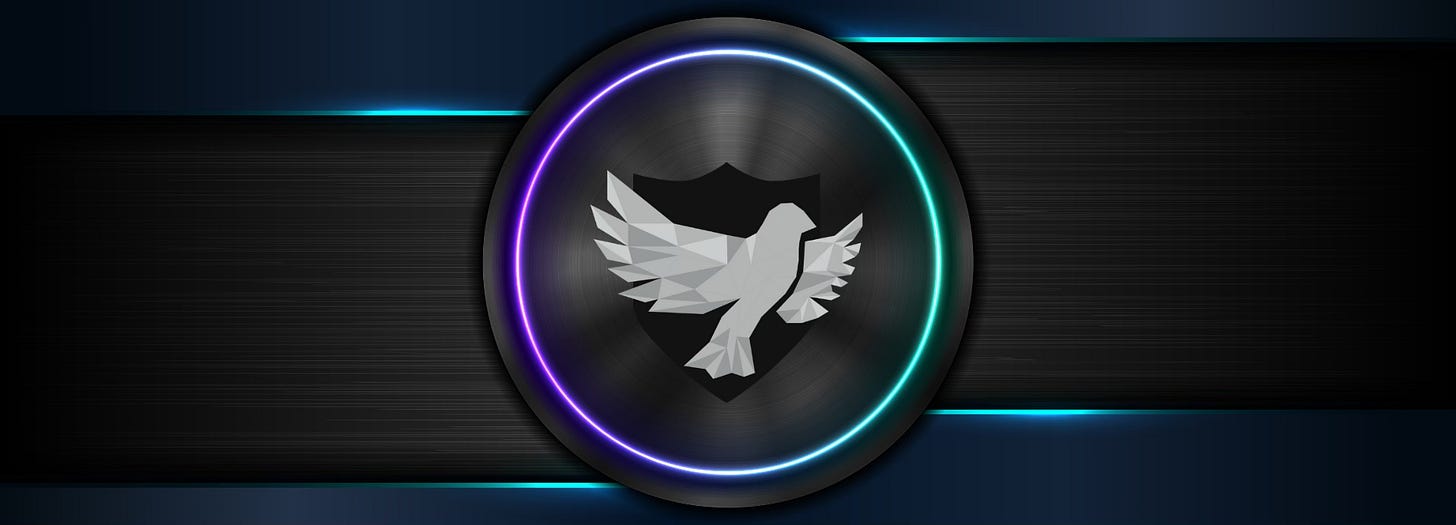All I'm Offering You Is The Truth
The Matrix mindset of liberation through deconstruction of society.
Few films have had a greater impact on modern thought than The Matrix. It is frequently cited by philosophers, cultural critics, and online influencers as an allegory for escaping the illusions imposed by society, religion, and tradition.
Neo, the protagonist, discovers that his perceived reality is an illusion—a digital simulation controlled by an oppressive system. Morpheus offers him a choice: Take the blue pill and remain ignorant, or take the red pill and awaken to the truth. Neo takes the red pill, discovers his “true power,” and transcends his former limitations.
Many modern YouTubers and internet influencers take The Matrix as a kind of divine revelation of personal empowerment. The “Red Pill” concept has become a positive metaphor for rejecting mainstream narratives and pursuing truth from alternative sources.
The original 1999 Matrix film was written and directed by the Wachowski brothers, Larry and Andy who, as one article reports, “were raised by a ‘hardcore atheist’ father and an ‘ex-Catholic turned Shamanist’ mother.” Born two years and six months apart (Larry in June 1965, and Andy in December 1967), the duo have been virtually inseparable professionally and privately. In addition to writing together under one moniker, the Wachowski brothers also transitioned to become Lana and Lilly, the Wachowski sisters over the years following the success of The Matrix. The film became one of the most influential sci-fi movies of all time, exploring themes of reality, simulation, control, and human freedom.
As it turns out, The Matrix was a harbinger of the most disturbing and destructive elements of postmodern relativism and a celebration of radical subjectivism—all of society is a construct that must be rejected, truth is not discovered but created through one's experience, and through critical consciousness, or deconstruction of so-called false consciousness, humanity can transcend its limitations and become godlike.
In a 2020 report by the BBC, Andy/Lily says that transgenderism, “was the original intention but,” when the film first hit screens in 1999, "the corporate world wasn't ready" for an allegory about transgender people.
In a Netflix interview, Andy/Lilly said
"The Matrix stuff was all about the desire for transformation but it was all coming from a closeted point of view. We had the character of Switch—a character who would be a man in the real world and then a woman in the Matrix…[that character] shows where our headspaces were…we were always living in a world of imagination.”
Wachowski said trans people often say, “[T]hese movies saved my life.” Paradoxically, instead of waking up to truth, they wake up to a different illusion—one of their own making.
The internet has become the vehicle for this new cultural revolution by encouraging individuals to isolate themselves in ideological echo chambers and to construct entirely personalized realities without any grounding reference to tradition or external authority.
The result is a world where truth is seen as a power structure to be deconstructed rather than a reality to be discovered. Personal autonomy becomes the highest virtue, and any external restraint—especially religious or moral—is viewed as oppression.
Classic stories like Plato’s Allegory of the Cave, Lewis Carroll’s Alice in Wonderland have been repurposed to fit The Matrix narrative; to promote relativism, skepticism, and rebellion against divine order. This Gnostic urge insists that true liberation isn't possible until all of society’s artificial constraints, including morality, religion, and even reality itself, are deconstructed.
Much of our culture believes it is seeking truth, but in reality, is running from it. Like Alice, many have fallen into a Wonderland of meaninglessness. Like the prisoners in Plato’s Cave, they are afraid to acknowledge objective truth. Like Neo, they believe personal empowerment through secret knowledge is the answer.
A recent Substack article written by Eric Wikström perfectly demonstrates this ideological shift. Wikström writes,
“What awaits beyond the Information Matrix isn't another pre-fabricated reality. It's something way more profound: the opportunity to participate consciously in reality's unfolding rather than unconsciously consuming its representation. But it only begins with your willingness to question everything, especially the things you most take for granted.”
This is an invitation to an invocation of the so-called higher self. It has become almost common in the West these days to believe that we all have a divine aspect, a transcendent part of our being that connects us to the ultimate source of wisdom. Contacting the higher self is often described in terms of deconstructing or denying the limitations of matter and space-time reality. It's also considered the pinnacle of mystical or magical practice as the higher self is believed to be our guide toward illumination or enlightenment.
Now that we've identified that characteristics of this false light worldview—rejection structure, divine authority, breaking down barriers to realize your full divine potential—consider Wikström's summarizing encouragement to his readers,
“The Matrix isn't a philosophical concept. It's the operating system currently running on human consciousness.” Understanding it isn't about becoming paranoid – it's about becoming free. When you see how the game board is arranged and recognize the plays being made, you're no longer just a piece being moved around. You become a player…you'll discover something extraordinary: the world is vastly more interesting, more alive, more fluid and more responsive to consciousness… Freedom isn't found in adopting new beliefs about the world. It's found in recognizing that you are not merely a passive observer of reality, but an active participant in its creation. And in that recognition lies the most profound freedom of all. When perception is no longer constrained by artificial frameworks, your experience becomes richer, more nuanced, and more authentically connected. You'll begin to notice patterns previously invisible. You'll perceive connections between seemingly unrelated domains. You'll develop intuitive capacities that seemed impossible within consensus reality frameworks. That's why they work so hard to make sure you never do. Too late. Now you see it too - and the question is no longer whether you can break free from The Matrix. The question is: what will you build once you do?”
What's the big deal, right? These people are just trying to make sense of the world to be freer and more authentic. What's the harm? We'll, to begin with, these narratives have been misinterpreted and even weaponized to promote relativism, expressive individualism, and an unanchored search for “truth” apart from divine revelation. Another way to say it is they're telling the truth falsely. The result has not been the discovery of freedom but the unraveling of coherence itself.
The first and most consequential example of exactly this type of deconstruction dates back to the Garden of Eden, where the serpent seduced Eve with a simple yet profoundly subversive question: “Did God really say…?” Satan, through the serpent, was the first to attempt to dismantle absolute truth by introducing doubt, relativism, and the promise of self-determination apart from God.
When the serpent asked, “Did God really say you shall not eat of any tree in the garden?” Eve's response shows that she understood the prohibition from (Genesis 2:16-17) and was fully aware of God’s will,
"We may eat the fruit of the trees of the garden, but of the fruit of the tree which is in the midst of the garden, God has said, ‘You shall not eat it, nor shall you touch it, lest you die.’” (Genesis 3:2-3).
This was not merely a mistake or an error in judgment born out of Eve's ignorance. It was a deliberate choice to reject God’s authority in favor of autonomous enlightenment.
Then, Genesis 3:4-5 records the serpent following the doubt sowing question with a blatant deception:
"You will not surely die. For God knows that when you eat of it, your eyes will be opened, and you will be like God, knowing good and evil."
Instead of misinformation, the serpent offers a temptation—a choice between trusting God’s authority or seizing self-determination. Corruption doesn't usually come all at once. Typically it begins with small compromises.
Now, with this in mind, consider once more Wikström's challenge:
“...the world you THINK you live in exists primarily as a mental construct. Your IDEA about reality has been shaped by forces outside your control, absorbed so gradually that you mistake it for reality itself.”
If you’re tracking with this, Wikström's next question should sound eerily familiar,
“What do you actually know? Not what you think you know. Not what you've been told. What do you know with absolute certainty, based on your direct experience?…This raises a radical question: How can we trust that history, events, or anything we're told about the world is true?”
Wikström suggests what we can know about reality based on direct experience or interaction with the material world is extremely limited—seeding the notion of hidden truths. The truth is, we can know quite a lot about our world through indirect experience. But Wikström's (and all of postmodernism's) point is that enlightenment and empowerment can only be achieved after the unreal, meaningless, social constructs are torn down.
“What if it all has been constructed to specifically keep us from truth?”
Much like the serpent, Wikström begins by subtly sowing doubt, then follows up with promises of enlightenment and personal power.
“You'll develop intuitive capacities that seemed impossible within consensus reality frameworks.”
Is that any different than what Satan promised Eve?
“your eyes will be opened, and you will be like God, knowing good and evil.”
The appeal is clear: You can either submit to God’s command or assert your own moral autonomy—as Eve did in her deliberate process of rejection,
"So when the woman saw that the tree was good for food, that it was a delight to the eyes, and that the tree was to be desired to make one wise, she took of its fruit and ate." (Genesis 3:6)
This verse outlines a deliberate cognitive process—Eve evaluated, desired, and acted believing it would make her wise. It wasn't a misunderstanding or mistake. It was a deliberate rejection of God’s will revealing the human inclination toward self-rule (Romans 1:18-21).
The original sin of Eve and Adam was not only the deconstruction of God's command, it was a declaration of independence from God’s authority. Conscious rebellion is the foundation of every false worldview—humanity attempting to define morality apart from divine revelation.
Satan began his attack with a question that planted doubt in Eve's mind. Then, once the mind was softened with doubt, he followed up with a blatant lie. But, it was Eve's desire to exit the Matrix that allowed the deceiver to gain a foothold with the first question.
So, always keep in mind as you listen to your favorite truth seeker podcast that the first one to say “question everything” was the most deceptive creature in all of God's creation.
Many cultural influencers argue that enlightenment is really about questioning everything and that deconstructing reality leads to true freedom. But, much like the plot of Alice in Wonderland, and going down the rabbit hole, what they fail to acknowledge is that Wonderland is not a paradise but a nightmare—a world where meaning collapses, where words have no fixed definitions, and where identity is constantly shifting. By the end of the story, even Alice rejects the chaos, opting to return to the real world. This should serve as a warning to modern culture: A world without objective truth is not liberating but destabilizing.
The real escape from deception is not in rejecting all structure, but in submitting to the One who created reality. Truth is not something we construct—it is someone we must know.
The answer is not to reject the world’s order but to recognize that it was created by God, corrupted by sin, and redeemed by Christ.
Unlike the postmodern obsession with self-created reality, Scripture teaches that truth is knowable, external, unchanging, and given by God. Jesus said,
“I am the way, the truth, and the life. No one comes to the Father except through me.” (John 14:6)
“Sanctify them in the truth; your word is truth.” (John 17:17)
Thank you for reading!
Please share this work to help expose and dismantle social engineering.
SOLI DEO GLORIA
Faith is Resistance!
About the authors of Armor of Truth: https://armoroftruth.substack.com/about
Download the Armor of Truth Mobile App Free
NEW! AoT Locals
NEW! AoT Telegram
Armor of Truth, Inc is a 501(c)(3) Non Profit Organization
Donations are tax deductible
By supporting Armor of Truth you are helping to reach thousands of people daily with the Gospel of Jesus Christ and encouragement to persevere in a world that is hostile to the gospel. Please consider making a donation to help support this mission.
Support Armor of Truth, official donation page: Donate


